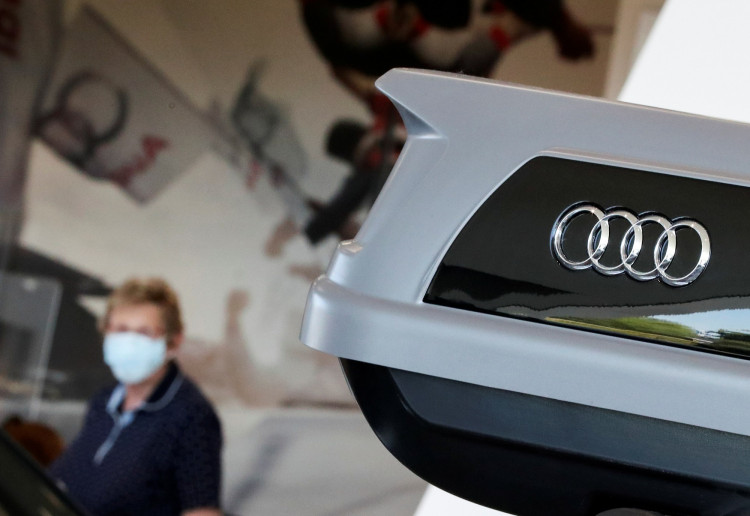Audi, once the unrivaled leader in China's luxury car market for 30 years, never anticipated how challenging it would be to reclaim its crown after losing the top spot in 2019. The brand, which enjoyed the benefits of being labeled as the "official car" for government use, once sold two to three times more than BMW and Mercedes-Benz. However, Audi's glory days seem to be fading as it nearly slips into the second-tier luxury camp, with the gap between it, Mercedes-Benz, and BMW widening.
Insurance data from the first ten months of the year shows Audi's sales in China at 566,800 units, nearly 100,000 units behind Mercedes-Benz and BMW, which sold 654,100 and 654,800 units, respectively. In terms of pricing, Audi's average transaction price in the Chinese market for the first eleven months was 307,000 yuan, compared to 504,000 yuan for Mercedes-Benz and 369,000 yuan for BMW.
Audi is also facing competition from Chinese newcomers like NIO and Li Auto, which boast average prices of 370,000 yuan and 350,000 yuan, respectively, surpassing Audi.
In a bid to regain its footing, Audi held a grand brand night on December 9, showcasing brands like Bentley, Lamborghini, and Ducati, all of which appeared together for the first time since Bentley joined the Audi Group in 2021. Audi used this opportunity to display the Q6 e-tron, set for production by the end of 2024, signaling its commitment to accelerating its electrification strategy.
Wenzeyue, President of Audi China, stated that the Q6 e-tron would set a new benchmark for the brand's high-end intelligent electric vehicles and symbolize Audi's determination to accelerate its electrification process in China. Volkswagen Group CEO Herbert Diess also mentioned that it would be a turning point for Audi's electrification.
However, soon after, Audi's new CEO Markus Duesmann suggested on December 19 that the company should slow down the pace of new electric vehicle introductions and continue to promote fuel and hybrid models in the short term. This statement has raised concerns about whether the German headquarters' opinions will further impact Audi's strategic planning in China.
Amid the dilemma of maintaining its fuel vehicle base and accelerating transformation, Audi seems somewhat hesitant. Audi China stated that official information should be referred to for strategic-related details.
Over the years, Audi has repeatedly devised new strategies and tactics for the Chinese market, including forming a new north-south Audi layout, promoting value-first strategies for performance and high-end cars, and focusing on electric and digital transformation. However, the effectiveness of these efforts has not been evident.
Now, as brands like Li Auto, NIO, and Jikrypton rapidly penetrate the luxury market with prices above 300,000 yuan and continuous advancements in intelligence, Audi risks a rapid fall if it cannot promptly recover.
Currently, Li Auto is pushing towards a monthly sales target of 50,000 units, potentially reshuffling the domestic BBA (BMW, Benz, Audi) landscape into "BBL" next year.
Audi's performance in China has tested the patience of its German headquarters. In late June, Volkswagen Group CEO Herbert Diess criticized Audi's lack of competitiveness in the Chinese market during an investor day, noting it was lagging behind competitors.
The lack of product competitiveness is Audi's most significant pain point. Diess pointed out that while the Audi brand has enormous potential, it has not been realized due to severe software issues and a model lineup lagging behind competitors.
However, there's an opportunity as the luxury car market will experience a "product vacuum" until around 2025 when new platform models from BMW and Mercedes-Benz are expected to hit the market. Wenzeyue believes that 2025 and 2026 will be a window period for Audi to improve its market performance, as the segment for vehicles priced above 350,000 yuan will gradually expand.
From announcing the largest product offensive in history at the April Shanghai Auto Show to replacing CEO Duesmann with former Volkswagen Group strategy chief Markus Duesmann in late June, Audi is gearing up for this window period.
Technology is also a focus for Audi. Facing the delayed production of Volkswagen Group's flagship SSP electric platform, Audi is accelerating the development of its PPE platform vehicles while opting to collaborate with SAIC Group. Amidst Mercedes-Benz and BMW's push towards L3 intelligent driving in China, rumors have emerged of Audi partnering with Huawei.
In early December, reports indicated that Huawei's new automotive business company was in talks with Audi to develop intelligent driving technology for models produced by FAW Audi by 2025. Audi China did not comment on the matter but did not deny it either.
As the market's winners and losers become evident, whether Audi can create a hit electric vehicle in the Chinese market is key to improving its reputation and sales.
Like many global automakers, Audi faces the dilemma of further investing in and accelerating electrification or maintaining its fuel vehicle base. This echoes recent statements from BMW's R&D chief Frank Weber denying BMW's abandonment of internal combustion engines and Mercedes-Benz's demonstration of intelligence in its fuel models. Audi's hesitation is somewhat understandable as it seeks a new balance between operational data, new energy transition, and regional competitive differentiation.
This requires Audi to untangle complex issues related to the market, joint ventures, parent company, and technology development in China.
Facing the rapid development of the new energy era and direct competition from multiple Chinese brands, Audi, once a dominant force, is unwilling to fade into obscurity. It must work harder and be more realistic to rewrite its destiny.






